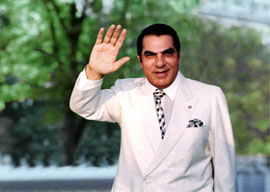
January 18, 2011

Zine El Abidine Ben Ali
Uneasy lies the head that wears a crown, especially today in the Maghreb and Middle East.
For the ouster of Tunisia’s Zine El Abidine Ben Ali has sent shock waves from Rabat to Riyadh. Autocrats, emirs and kings have to be asking themselves: If rioters can bring down Ben Ali with his ruthless security forces, what prevents this from happening here?
Millions of militant Muslim young who have never shared in the wealth produced by the oil and gas must be asking: If Tunisians can take down a detested regime, why cannot we?
America had no role in this uprising, and our diplomats had been appalled at the corruption. Yet Ben Ali was an ally in the war on terror, and what happened in Tunisia could trigger a series of devastating blows to the U.S. position in the Middle East.
For when autocrats fall, it is not always democracy that rises. And in the Middle East, democracy is not necessarily America’s ally.
The fall of King Farouk in 1952 led to Col. Nasser in Egypt. The ouster and murder of King Faisal in Iraq in 1958 led to Saddam. The fall of King Idris in Libya in 1969 led to Gadhafi. The fall of Emperor Haile Selassie in Ethiopia in 1974 led to the rise of the murderous Col. Mengistu. And the fall of the Shah of Iran in 1979 led to the Ayatollah Khomeini.
Often the old saw applies: “Better the devil we know…”
And should a new wave of revolts sweep the region, we might see the final collapse of the neoconservative foreign policy of George W. Bush.
That Mideast policy rested on several pillars: uncritical support of Israel, invasions to oust enemies in Afghanistan and Iraq, and U.S. occupations to rebuild and convert these nations into democracies.
Well before he left office, these policies had made the region so anti-American that Bush was himself, in opinion surveys, viewed less favorably by the Muslim masses than Osama bin Laden.
And when Bush, having declared at his 2005 inaugural that his goal was now to “end tyranny in our world,” called for elections in the Middle East, he got the results his policies had produced.
In Palestine, Hamas swept to power. In Lebanon, Hezbollah made such gains it was brought into the Lebanese government it has just brought down. When Egypt’s Hosni Mubarak allowed some electoral districts to be contested, the Muslim Brotherhood won most of them.
In Iran in 2005, Mahmoud Ahmadinejad was elected and became an instant favorite of the Arab masses because of his hostility toward Israel. The trend continued in the Iraqi elections of 2010, which enhanced the prestige and power of the anti-American Muqtada al-Sadr.